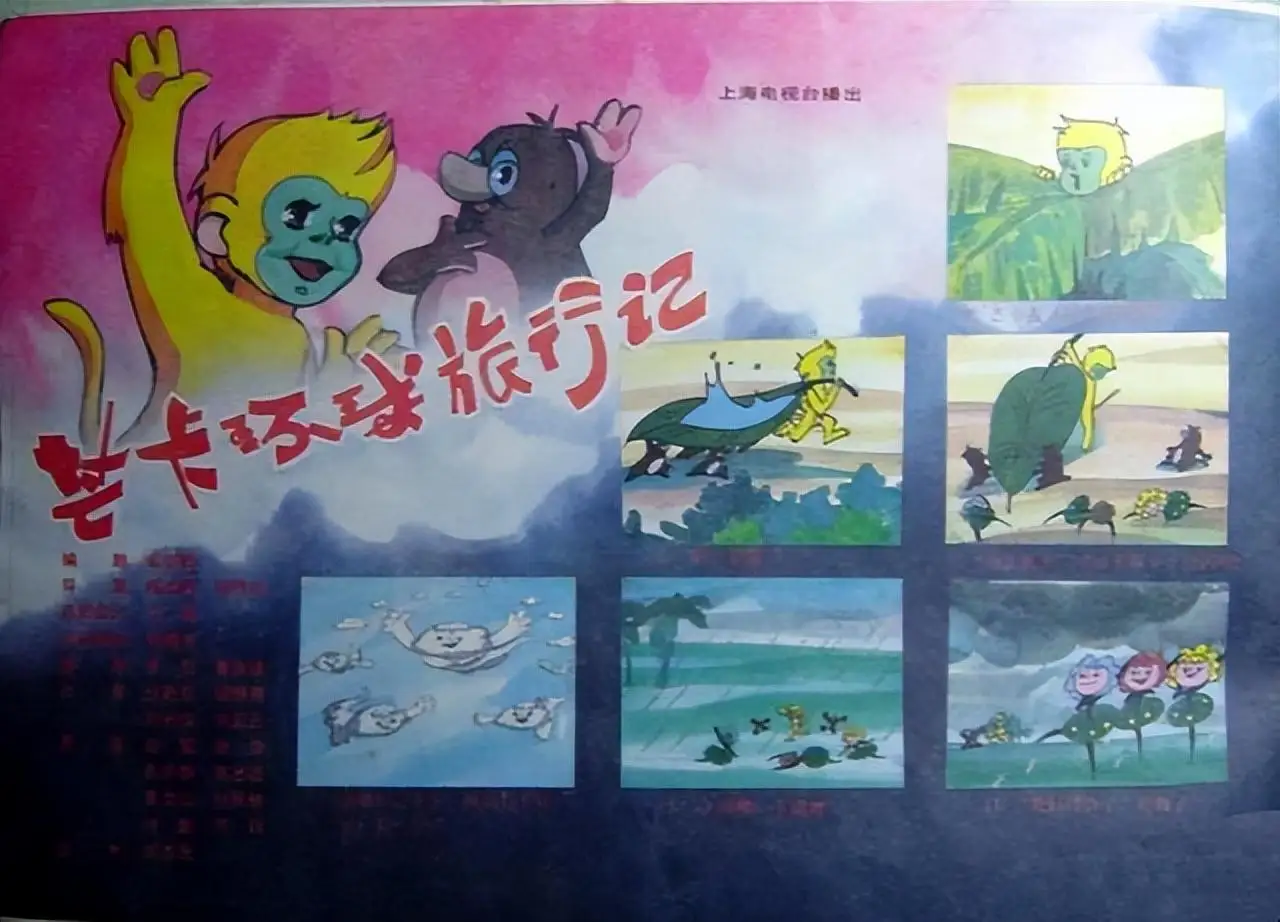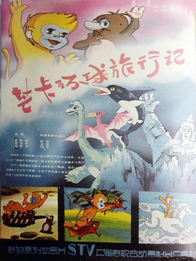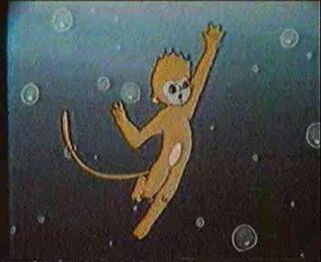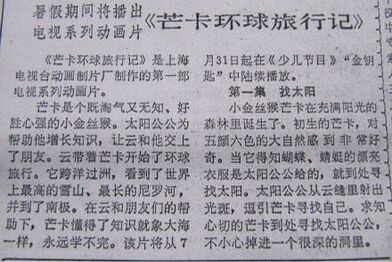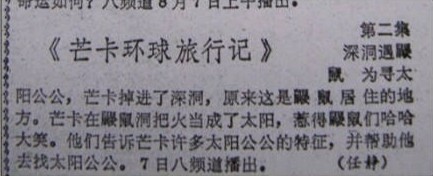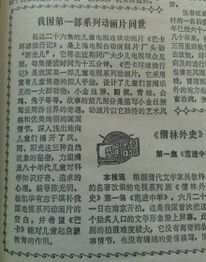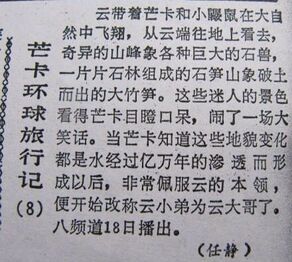Mangka's Around the World (lost first Chinese animated TV series; 1985): Difference between revisions
(Created page with "{{InfoboxLost |title=<center>Mangka's Around the World</center> |image=Mongka promo poster 1.webp |imagecaption=Promo poster |status=<span style="color:red;">'''Lost'''</span> }} '''''Mangka's Around the World''''' (芒卡环球旅行记, Mángkǎ huánqiú lǚxíng jì) was the first Chinese animated television series produced by Shanghai Television Animation Studio and aired on Shanghai Television. It consisted of 26 episodes, running 15 minutes, and was aired in 1985....") |
No edit summary |
||
| (3 intermediate revisions by 2 users not shown) | |||
| Line 2: | Line 2: | ||
|title=<center>Mangka's Around the World</center> | |title=<center>Mangka's Around the World</center> | ||
|image=Mongka promo poster 1.webp | |image=Mongka promo poster 1.webp | ||
|imagecaption=Promo poster | |imagecaption=Promo poster. | ||
|status=<span style="color:red;">'''Lost'''</span> | |status=<span style="color:red;">'''Lost'''</span> | ||
}} | }} | ||
| Line 11: | Line 11: | ||
Directors Chen Guangming and Yang Kaihua explain that the series was created to teach children about the origins and development of nature, such as wind, rain, lightning, and landforms, as well as scientific and accurate information about the sun, moon, earth, and outer space, and to inspire knowledge, morality, love of nature, and exploration. In creating the series, the team took into account the children's level of knowledge, understanding, and appreciation of their interests, and tried to recreate their lives, actions, and ideas. Although the series is designed to teach scientific knowledge, they says, we has tried to avoid "indoctrination" and to present the series in an easy-to-understand way, following the real-life situations that children may encounter in their daily lives<ref name=Mongka>[https://bangumi.tv/blog/302650 From the comments on page about the show in Bangumi.tv] Retrieved 31 Jan, 2024</ref>. | Directors Chen Guangming and Yang Kaihua explain that the series was created to teach children about the origins and development of nature, such as wind, rain, lightning, and landforms, as well as scientific and accurate information about the sun, moon, earth, and outer space, and to inspire knowledge, morality, love of nature, and exploration. In creating the series, the team took into account the children's level of knowledge, understanding, and appreciation of their interests, and tried to recreate their lives, actions, and ideas. Although the series is designed to teach scientific knowledge, they says, we has tried to avoid "indoctrination" and to present the series in an easy-to-understand way, following the real-life situations that children may encounter in their daily lives<ref name=Mongka>[https://bangumi.tv/blog/302650 From the comments on page about the show in Bangumi.tv] Retrieved 31 Jan, 2024</ref>. | ||
==Release== | ==Release== | ||
A pilot version of two episodes of this series was produced and aired during the Chinese New Year, which was well received, and the series was officially aired on Children's Day, June 1, according to a | A pilot version of two episodes of this series was produced and aired during the Chinese New Year, which was well received, and the series was officially aired on Children's Day, June 1, according to a magazine ''Shanghai Dianshi''<ref name=Mongka />. However, a TV newspaper reported that the series will be aired on July 31 in a children's program called ''Xiaoer Jiemu'' (小儿节目), which may be a rerun, but this is not known at this time. | ||
==Availability== | ==Availability== | ||
Not a single episode of this series is available online. Despite being the first animated TV series in China, it was not even released as home media such as VHS or DVD. | Not a single episode of this series is available online. Despite being the first animated TV series in China, it was not even released as home media such as VHS or DVD. | ||
==Gallery== | ==Gallery== | ||
<gallery mode=packed heights=175px> | <gallery mode=packed heights=175px> | ||
Mongka promo poster 2.webp| | Mongka promo poster 2.webp|Another promo poster. | ||
Mongka Screenshot.jpg|The only available screenshot. | Mongka Screenshot.jpg|The only available screenshot. | ||
Mongka Newspaper Article 1.jpg|Newspaper article reporting that the first day of airing was July 31. | Mongka Newspaper Article 1.jpg|Newspaper article reporting that the first day of airing was July 31. | ||
| Line 23: | Line 23: | ||
Mongka Newspaper Article 4.jpg | Mongka Newspaper Article 4.jpg | ||
</gallery> | </gallery> | ||
==References== | ==References== | ||
{{reflist}} | {{reflist}} | ||
[[Category:Lost animation]][[Category:Lost TV]][[Category:Completely lost media]] | |||
[[Category:Lost animation]] | |||
[[Category:Lost TV]] | |||
[[Category:Completely lost media]] | |||
[[Category:Historic]] | |||
Latest revision as of 00:44, 10 July 2024
Mangka's Around the World (芒卡环球旅行记, Mángkǎ huánqiú lǚxíng jì) was the first Chinese animated television series produced by Shanghai Television Animation Studio and aired on Shanghai Television. It consisted of 26 episodes, running 15 minutes, and was aired in 1985.
Plot
Mangka, a golden monkey living in the forest, was mischievous, ignorant, and competitive. The sun asked Laoka to turn a small drop of water into a cloud and take Mangka on a journey to help him learn knowledge. Wherever he goes, the childish Mangka jokes around, makes many people laugh, and also learns a lot about nature.
Production
Directors Chen Guangming and Yang Kaihua explain that the series was created to teach children about the origins and development of nature, such as wind, rain, lightning, and landforms, as well as scientific and accurate information about the sun, moon, earth, and outer space, and to inspire knowledge, morality, love of nature, and exploration. In creating the series, the team took into account the children's level of knowledge, understanding, and appreciation of their interests, and tried to recreate their lives, actions, and ideas. Although the series is designed to teach scientific knowledge, they says, we has tried to avoid "indoctrination" and to present the series in an easy-to-understand way, following the real-life situations that children may encounter in their daily lives[1].
Release
A pilot version of two episodes of this series was produced and aired during the Chinese New Year, which was well received, and the series was officially aired on Children's Day, June 1, according to a magazine Shanghai Dianshi[1]. However, a TV newspaper reported that the series will be aired on July 31 in a children's program called Xiaoer Jiemu (小儿节目), which may be a rerun, but this is not known at this time.
Availability
Not a single episode of this series is available online. Despite being the first animated TV series in China, it was not even released as home media such as VHS or DVD.
Gallery
References
- ↑ 1.0 1.1 From the comments on page about the show in Bangumi.tv Retrieved 31 Jan, 2024
